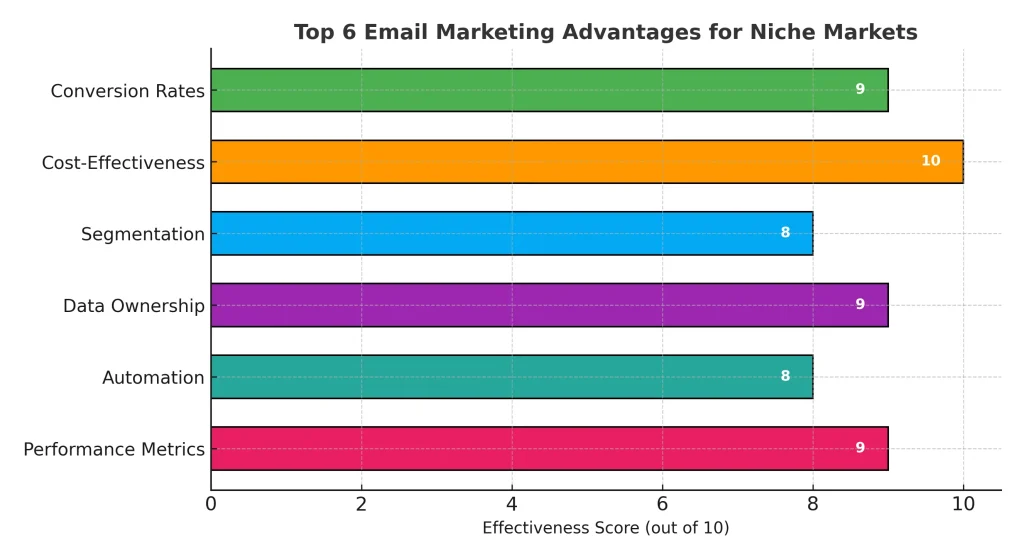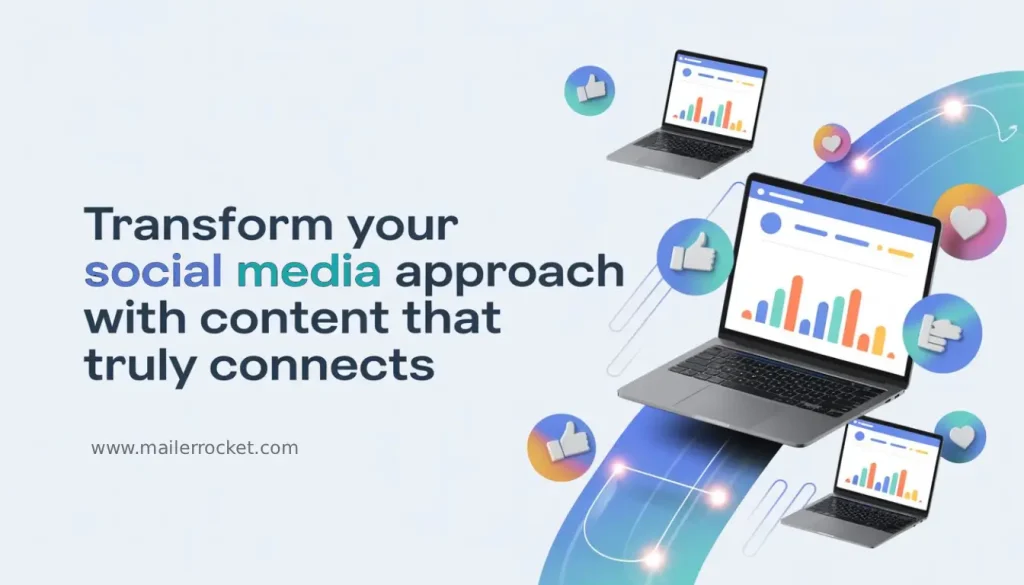As a business professional, you’re constantly seeking efficient marketing solutions that drive results. In today’s competitive landscape, understanding the advantages of targeted marketing is crucial for success.
When it comes to reaching your target audience, you’re faced with a dilemma: should you focus on email marketing or social media? Both channels have their strengths and weaknesses, and making an informed decision is vital.
This article will delve into the email benefits analysis and the challenges of social media in niche market strategies, empowering you to make data-driven decisions that boost your marketing efforts.
Key Takeaways
- Understanding the importance of targeted marketing in niche markets
- The benefits of email marketing in reaching your target audience
- The challenges of social media marketing in niche markets
- How to make informed decisions about your marketing channels
- Strategies for leveraging email marketing and overcoming social media challenges
Discover how targeted email campaigns outperform social media in precision, ROI, and engagement for niche audiences.
The Current Digital Marketing Landscape
As we navigate the complex world of digital marketing, understanding the current landscape is crucial for success. The digital marketing sphere has undergone significant transformations over the years, with various channels emerging and evolving to capture audience attention.
Evolution of Digital Marketing Channels
Digital marketing channels have evolved substantially, from the early days of email marketing to the current era of social media dominance. Marketers now have a plethora of options, including search engine optimization (SEO), pay-per-click (PPC) advertising, content marketing, and more.
The Importance of Channel Selection for Niche Markets
For niche markets, selecting the right digital marketing channels is particularly crucial. It directly impacts the effectiveness of marketing efforts and return on investment (ROI).
Cost Considerations
One of the primary factors in channel selection is cost. Different channels have varying cost structures, from the relatively low costs of email marketing to the potentially high costs of PPC advertising.
Audience Accessibility Factors
Another critical factor is audience accessibility. Understanding where your target audience is most active and engaged is key to choosing the most effective channels.
| Channel | Cost | Audience Accessibility |
|---|---|---|
| Email Marketing | Low | High |
| Social Media | Variable | High |
| PPC Advertising | High | Medium |
By carefully considering these factors, marketers can make informed decisions about where to allocate their resources, maximizing their reach and impact within their niche markets.
Understanding Niche Market Strategies in 2023
As we dive into 2023, understanding niche market strategies becomes crucial for businesses aiming to carve out their unique space in the digital landscape. The digital marketplace is becoming increasingly saturated, making it essential for businesses to adopt targeted marketing approaches that resonate with their specific audience.
Defining Niche Markets in the Digital Age
Niche markets are defined by their unique characteristics, needs, and preferences. In the digital age, these markets are more accessible than ever, thanks to advanced data analytics and personalized marketing tools. Businesses can now identify and cater to niche audiences with unprecedented precision.
Why Traditional Marketing Approaches Fall Short
Traditional marketing approaches often fall short in niche markets because they fail to account for the specific needs and nuances of these audiences. Mass marketing techniques can be too broad, diluting the message and failing to engage the target audience effectively.
Niche Market Expansion Ideas
Expanding into niche markets requires innovative strategies. Two effective approaches include:
- Vertical Expansion Techniques: This involves deepening your market penetration within a specific niche by offering more specialized products or services.
- Horizontal Market Penetration: This strategy involves expanding your reach across related niches, leveraging your existing expertise and brand recognition.
Vertical Expansion Techniques
Vertical expansion allows businesses to strengthen their position within a niche by diversifying their offerings. This can involve creating complementary products or enhanced services that add value to the customer.
Horizontal Market Penetration
Horizontal market penetration involves identifying adjacent niches where your brand can naturally extend its presence. This strategy requires a deep understanding of your brand’s core strengths and how they can be applied to new markets.
Email Benefits Analysis, Social Media Challenges, Niche Market Strategies: The Complete Picture
In today’s complex digital landscape, understanding the interplay between email marketing, social media challenges, and niche market strategies is crucial for developing effective marketing campaigns. As you navigate the multifaceted world of digital marketing, it’s essential to recognize how these elements interconnect and impact your overall strategy.
The Interconnected Nature of Modern Marketing
Modern marketing is no longer about isolated channels; it’s about understanding how email, social media, and niche market strategies work together to create a cohesive brand presence. Email marketing provides a direct line to customers, while social media offers a broader reach and engagement opportunities. Niche market strategies allow businesses to target specific audiences with tailored messages.
Comparative Analysis Framework
To effectively analyze email benefits and social media challenges, businesses need a comparative analysis framework. This framework should consider factors such as:
- Reach and engagement metrics
- Conversion rates and ROI
- Customer segmentation and targeting capabilities
- Content strategy and creation
By comparing these elements across channels, businesses can identify strengths, weaknesses, and opportunities for optimization.
Measuring Success Across Channels
Measuring success in a multi-channel marketing environment requires a nuanced approach. Businesses must track key performance indicators (KPIs) across email, social media, and niche market campaigns to understand their collective impact. This includes monitoring metrics such as open rates, click-through rates, conversion rates, and customer acquisition costs.
By adopting a comprehensive view of their marketing efforts, businesses can make informed decisions about resource allocation and strategy adjustments, ultimately leading to more effective niche market targeting and improved overall marketing performance.
The 6 Key Email Marketing Advantages for Niche Markets

Email marketing stands out as a pivotal strategy for niche markets, offering targeted advantages that broader marketing channels can’t match. By leveraging email benefits analysis, businesses can directly communicate with their audience, fostering a more personal and engaging experience.
1. Higher Conversion Rates and Direct Sales Impact
Email marketing allows for targeted campaigns that speak directly to the interests of your niche audience, leading to higher conversion rates. By personalizing your messages, you can increase the likelihood of turning leads into sales.
2. Cost-Effectiveness and Demonstrable ROI
Compared to other marketing channels, email marketing is highly cost-effective. It allows businesses to reach a large audience at a fraction of the cost of traditional marketing methods. Moreover, the ROI of email marketing campaigns can be easily measured, providing clear insights into their effectiveness.
3. Precise Audience Segmentation Capabilities
Email marketing enables businesses to segment their audience based on various criteria, ensuring that the right message reaches the right people at the right time. This precise segmentation is crucial for niche markets, where understanding the specific needs of your audience can make a significant difference in your marketing success.
4. Ownership of Contact Lists and Data
With email marketing, you own your contact list and the data associated with it. This is a significant advantage over social media platforms, where your reach can be limited by algorithm changes. Owning your data gives you control and flexibility in your marketing efforts.
5. Advanced Automation Possibilities
Email marketing platforms offer advanced automation capabilities, allowing you to set up complex campaigns that trigger based on user behavior. This means you can nurture leads and maintain customer relationships with minimal manual intervention, making your marketing efforts more efficient.
6. Comprehensive Performance Metrics
The performance of email marketing campaigns can be tracked in detail, providing insights into open rates, click-through rates, conversion rates, and more. These comprehensive metrics enable businesses to refine their marketing strategies, improving their overall effectiveness.
| Email Marketing Advantage | Description | Benefit |
|---|---|---|
| Higher Conversion Rates | Targeted campaigns for niche audiences | Increased sales |
| Cost-Effectiveness | Lower costs compared to traditional marketing | Better ROI |
| Precise Segmentation | Targeting based on specific criteria | More effective marketing |
Combine email precision with social reach for a powerful, integrated marketing approach.
Email Marketing Solutions for Specific Niche Industries
In the realm of niche marketing, email campaigns stand out as a powerful tool for driving conversions and customer loyalty. By tailoring email marketing solutions to the unique needs of specific niche industries, businesses can significantly enhance their marketing effectiveness.
B2B Niche Market Email Strategies
B2B niche markets require email strategies that are both informative and engaging. Two key approaches include:
Lead Nurturing Sequences
Implementing lead nurturing sequences helps guide potential clients through the sales funnel, providing them with relevant content at each stage of their decision-making process.
Educational Content Distribution
Distributing educational content via email keeps your audience informed about industry trends and positions your brand as a thought leader.
B2C Niche Market Email Approaches
B2C niche markets benefit from email strategies that focus on personalization and customer retention. Key tactics include:
Personalization Techniques
Using personalization techniques in email campaigns, such as addressing customers by name and tailoring content based on their preferences, can significantly boost engagement.
Loyalty Program Integration
Integrating loyalty programs into your email marketing strategy rewards repeat customers and encourages continued loyalty.
By adopting these email marketing solutions tailored to specific niche industries, businesses can improve their marketing ROI and build stronger relationships with their target audience.
Email ROI Calculation for Niche Market Campaigns (email benefits analysis)
Email marketing ROI calculation is a vital metric for niche businesses to gauge the success of their campaigns. To effectively measure ROI, you need to understand the key components that contribute to the overall performance of your email marketing efforts.
Essential Metrics to Track
To accurately calculate email ROI, focus on the following essential metrics:
- Open rates: The percentage of recipients who open your emails.
- Click-through rates (CTR): The percentage of recipients who click on links within your emails.
- Conversion rates: The percentage of recipients who complete a desired action.
- Revenue generated: The total revenue attributed to your email marketing campaigns.
ROI Calculation Methodology
The ROI calculation involves comparing the revenue generated from email marketing campaigns to the costs incurred. The formula is: (Gain – Cost) / Cost * 100. You need to track both the revenue and the costs associated with your email marketing efforts to apply this formula effectively.

Benchmarking Against Industry Standards
Once you have calculated your email ROI, it’s crucial to benchmark it against industry standards. This comparison helps you understand how your campaigns are performing relative to your competitors. Industry benchmarks can be found through research reports and studies published by marketing research firms.
By understanding and applying these principles, you can optimize your email marketing campaigns for better ROI and improved overall performance.
Social Media Challenges in Niche Market Targeting
The ever-changing world of social media poses substantial challenges for businesses targeting niche markets. As platforms evolve, marketers must adapt to new obstacles that can impact their strategies.
Algorithm Changes and Visibility Issues
One of the primary challenges is navigating algorithm changes that affect content visibility. Social media platforms frequently update their algorithms, making it difficult for niche marketers to maintain consistent reach. These changes can significantly impact the visibility of niche content, requiring marketers to adjust their strategies continually.
Platform Saturation and Content Noise
Platform saturation is another significant challenge. With the vast amount of content being generated daily, niche market content can easily get lost in the noise. Marketers must find innovative ways to make their content stand out.
Privacy Concerns and Data Limitations
Privacy concerns and data limitations also pose significant hurdles. Stricter data privacy regulations limit the amount of user data available for targeted advertising, making it harder for niche marketers to reach their audiences effectively.
Cost Escalation for Targeted Reach
The cost of achieving targeted reach on social media is escalating. This is partly due to increased competition for ad space and the complexity of targeting niche audiences.
Ad Bidding Competition
Ad bidding competition has become fierce, driving up costs for niche marketers. As more businesses compete for the same audience, the cost per click and cost per impression increase.
Diminishing Organic Reach
Moreover, the organic reach of social media content is diminishing. Platforms prioritize paid content, making it challenging for niche marketers to achieve visibility without a significant advertising budget.
| Challenge | Impact on Niche Marketers | Potential Solution |
|---|---|---|
| Algorithm Changes | Reduced visibility | Stay updated with algorithm changes, adjust content strategy |
| Platform Saturation | Content gets lost in noise | Use innovative content creation, engage with audience |
| Privacy Concerns | Limited data for targeting | Comply with data privacy regulations, use alternative targeting methods |
As noted by a social media expert,
“The key to overcoming social media challenges lies in understanding the ever-changing landscape and adapting your strategy accordingly.”
In conclusion, niche marketers face multiple challenges on social media, from algorithm changes to cost escalation. By understanding these challenges and adapting their strategies, businesses can more effectively target their niche audiences.
Social Media Marketing Strategies to Overcome Challenges
Social media marketing presents unique challenges that require tailored strategies. To succeed, you must adapt your approach to the ever-changing social media landscape.
Content Strategy Refinement
Refining your content strategy is crucial for overcoming social media challenges. This involves creating content that resonates with your audience and leveraging the right formats for each platform. High-quality, engaging content is key to capturing attention and driving engagement.

Community Building Approaches
Building a strong community around your brand can help mitigate social media challenges. This involves creating a dialogue with your audience, responding to comments, and fostering a sense of belonging among your followers.
Platform-Specific Feature Utilization
Each social media platform has its unique features. Utilizing these features effectively can enhance your marketing efforts. For example, using Instagram Stories or Facebook Live can increase engagement and reach.
Paid vs. Organic Strategy Balance
Finding the right balance between paid and organic strategies is vital. While organic reach is important, paid advertising can amplify your message and drive conversions. A balanced approach ensures maximum ROI.
By implementing these strategies, you can overcome the challenges of social media marketing and achieve your marketing goals.
Social Media Engagement Tips for Niche Market Brands
Niche market brands can significantly enhance their social media engagement by focusing on content that sparks meaningful conversations. To achieve this, it’s essential to understand your audience and tailor your content accordingly.
Creating Conversation-Worthy Content
Developing content that encourages engagement is crucial. This can be achieved by:
- Using provocative questions that stimulate discussion.
- Creating informative content that adds value to your audience.
- Utilizing visually appealing graphics to capture attention.
Leveraging User-Generated Content
User-generated content (UGC) is a powerful tool for boosting engagement. It not only reduces content creation costs but also fosters a sense of community. To leverage UGC, you can:
- Encourage customers to share their experiences with your brand.
- Host contests or giveaways that incentivize content creation.
- Feature customer-generated content on your social media channels.
Effective Community Management Practices
Effective community management is vital for maintaining a positive brand image. This involves:
Response Time Optimization
Responding promptly to customer inquiries and comments is crucial. Aim to respond within:
| Platform | Response Time |
|---|---|
| Within 1 hour | |
| Within 2 hours | |
| Within 2 hours |
Crisis Management Protocols
Having a crisis management plan in place is essential. This includes:
- Identifying potential crisis scenarios.
- Developing a response strategy.
- Training your team to handle crises effectively.
By implementing these social media engagement tips, niche market brands can enhance their online presence and build a loyal customer base.
Get data-backed insights to refine your niche market strategies and make informed marketing decisions.
Integrating Email and Social Media for Comprehensive Niche Market Targeting
To maximize your niche market targeting efforts, integrating email and social media marketing is crucial. By combining these channels, you can create a cohesive marketing strategy that leverages the strengths of both.
Cross-Channel Content Strategies
Developing content that works across both email and social media platforms is key to a successful integrated marketing strategy. This involves creating a content calendar that aligns with your overall marketing goals.
Data Sharing Between Platforms
Sharing data between email and social media platforms allows for a more comprehensive understanding of your audience. This data can be used to create targeted campaigns that drive engagement.
Customer Journey Mapping Across Channels
Understanding the customer journey across both email and social media is crucial for creating a seamless user experience. This involves mapping out the touchpoints a customer has with your brand.
Unified Messaging Approaches
A unified messaging approach ensures that your brand’s message is consistent across all channels. This includes maintaining
Brand Voice Consistency
and coordinating
Campaign Timing
.
| Channel | Content Type | Timing |
|---|---|---|
| Promotional Offers | Weekly | |
| Social Media | Engagement Content | Daily |
| Both | Brand Storytelling | Monthly |
By integrating email and social media marketing, you can create a powerful niche market targeting strategy that drives results.
Conclusion: Building Effective Niche Market Communication Strategies
As you’ve seen, developing a robust marketing strategy for niche markets requires a deep understanding of the unique challenges and opportunities presented by these specialized audiences. By leveraging the strengths of both email and social media channels, you can create a comprehensive marketing approach that drives real results.
Effective niche market communication strategies hinge on precise audience segmentation, compelling content, and a clear understanding of the channels your audience prefers. Email marketing offers higher conversion rates, cost-effectiveness, and advanced automation possibilities, making it an indispensable tool for niche market targeting.
Meanwhile, social media provides a platform for community building, content sharing, and targeted advertising. By integrating these channels, you can create a cohesive marketing strategy that resonates with your niche audience. As you move forward, focus on refining your approach based on performance metrics and industry benchmarks to continually improve your marketing efforts.
By adopting these effective marketing strategies, you’ll be well on your way to establishing a strong presence in your niche market and driving long-term success.


